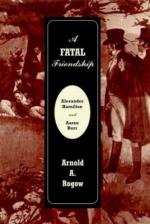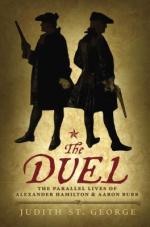July 11, 2019 | quinnt
On July 11, 1804, Alexander Hamilton and Aaron Burr met in Weehawken, New Jersey at dawn to settle their personal, professional, and political differences in a duel. The rest is history. It is also now a hit Broadway musical! If you would like to learn more about Alexander Hamilton, Aaron Burr, and the most famous duel in American history, check out these books:
For almost two centuries, historians have had difficulty explaining the extraordinary duel in July 1804 that killed Alexander Hamilton, the nation's first Secretary of the Treasury, and ended Vice President Aaron Burr's political career. It was well known that Hamilton disliked Burr -- perhaps out of a protective fear of losing his own power and influence, or perhaps, according to another theory, because of jealousy over the attentions of one or more women. When Burr finally threw down his challenge, it followed more than a dozen years of difficult relations and political strife, culminating a few months earlier with Burr's defeat in the race for the governorship of New York, a defeat he attributed to Hamilton's machinations. But why a duel? In A Fatal Friendship, the distinguished political scientist and writer Arnold Rogow demonstrates for the first time that the roots of the fatal encounter lay not in Burr's (admittedly flawed) political or private conduct, but rather in Hamilton's conflicted history and character. With his detailed archival research, his close (and unprecedented) examination of the friendship between the two heroic figures, and his bold, imaginative writing, Rogow has written a brilliant new book that will change forever our understanding of honor, politics, and friendship in the early American republic.
In curiously parallel lives, Alexander Hamilton and Aaron Burr were both orphaned at an early age. Both were brilliant students who attended college--one at Princeton, the other at Columbia--and studied law. Both were young staff officers under General George Washington, and both became war heroes. Politics beckoned them, and each served in the newly formed government of the fledgling nation. Why, then, did these two face each other at dawn in a duel that ended with death for one and harsh criticism for the other?
Judith St. George's lively biography, told in alternating chapters, brings to life two complex men who played major roles in the formation of the United States.
America has gone Hamilton crazy. Lin-Manuel Miranda's Tony-winning musical has spawned sold-out performances, a triple platinum cast album, and a score so catchy that it is being used to teach U.S. history in classrooms across the country. But just how historically accurate is Hamilton? And how is the show itself making history?
Historians on Hamilton brings together a collection of top scholars to explain the Hamilton phenomenon and explore what it might mean for our understanding of America's history. The contributors examine what the musical got right, what it got wrong, and why it matters. Does Hamilton's hip-hop take on the Founding Fathers misrepresent our nation's past, or does it offer a bold positive vision for our nation's future? Can a musical so unabashedly contemporary and deliberately anachronistic still communicate historical truths about American culture and politics? And is Hamilton as revolutionary as its creators and many commentators claim?
Perfect for students, teachers, theater fans, hip-hop heads, and history buffs alike, these short and lively essays examine why Hamilton became an Obama-era sensation and consider its continued relevance in the age of Trump. Whether you are a fan or a skeptic, you will come away from this collection with a new appreciation for the meaning and importance of the Hamilton phenomenon.
In the summer of 1804, two of America's most eminent statesmen squared off, pistols raised, on a bluff along the Hudson River. That two such men would risk not only their lives but the stability of the young country they helped forge is almost beyond comprehension. Yet we know that it happened. The question is why.
In War of Two, John Sedgwick explores the long-standing conflict between Founding Father Alexander Hamilton and Vice President Aaron Burr. A study in contrasts from birth, they had been compatriots, colleagues, and even friends. But above all they were rivals. Matching each other's ambition and skill as lawyers in New York, they later battled for power along political fault lines that would not only decide the future of the United States, but define it.
A series of letters between Burr and Hamilton suggest the duel was fought over an unflattering comment made at a dinner party. But another letter, written by Hamilton the night before the event, provides critical insight into his true motivation. It was addressed to former Speaker of the House Theodore Sedgwick, a trusted friend of both men, and the author's own ancestor.
John Sedgwick suggests that Hamilton saw Burr not merely as a personal rival but as a threat to the nation. Burr would prove that fear justified after Hamilton's death when, haunted by the legacy of his longtime adversary, he embarked on an imperial scheme to break the Union apart.
Pulitzer Prize-winning author Ron Chernow presents a landmark biography of Alexander Hamilton, the Founding Father who galvanized, inspired, scandalized, and shaped the newborn nation.
In the first full-length biography of Alexander Hamilton in decades, Ron Chernow tells the riveting story of a man who overcame all odds to shape, inspire, and scandalize the newborn America. According to historian Joseph Ellis, Alexander Hamilton is "a robust full-length portrait, in my view the best ever written, of the most brilliant, charismatic and dangerous founder of them all."
Few figures in American history have been more hotly debated or more grossly misunderstood than Alexander Hamilton. Chernow's biography gives Hamilton his due and sets the record straight, deftly illustrating that the political and economic greatness of today's America is the result of Hamilton's countless sacrifices to champion ideas that were often wildly disputed during his time. "To repudiate his legacy," Chernow writes, "is, in many ways, to repudiate the modern world." Chernow here recounts Hamilton's turbulent life: an illegitimate, largely self-taught orphan from the Caribbean, he came out of nowhere to take America by storm, rising to become George Washington's aide-de-camp in the Continental Army, coauthoring The Federalist Papers, founding the Bank of New York, leading the Federalist Party, and becoming the first Treasury Secretary of the United States.Historians have long told the story of America's birth as the triumph of Jefferson's democratic ideals over the aristocratic intentions of Hamilton. Chernow presents an entirely different man, whose legendary ambitions were motivated not merely by self-interest but by passionate patriotism and a stubborn will to build the foundations of American prosperity and power. His is a Hamilton far more human than we've encountered before--from his shame about his birth to his fiery aspirations, from his intimate relationships with childhood friends to his titanic feuds with Jefferson, Madison, Adams, Monroe, and Burr, and from his highly public affair with Maria Reynolds to his loving marriage to his loyal wife Eliza. And never before has there been a more vivid account of Hamilton's famous and mysterious death in a duel with Aaron Burr in July of 1804.
Chernow's biography is not just a portrait of Hamilton, but the story of America's birth seen through its most central figure. At a critical time to look back to our roots, Alexander Hamilton will remind readers of the purpose of our institutions and our heritage as Americans.




